If you are looking wholesale lighting solutions, click here.
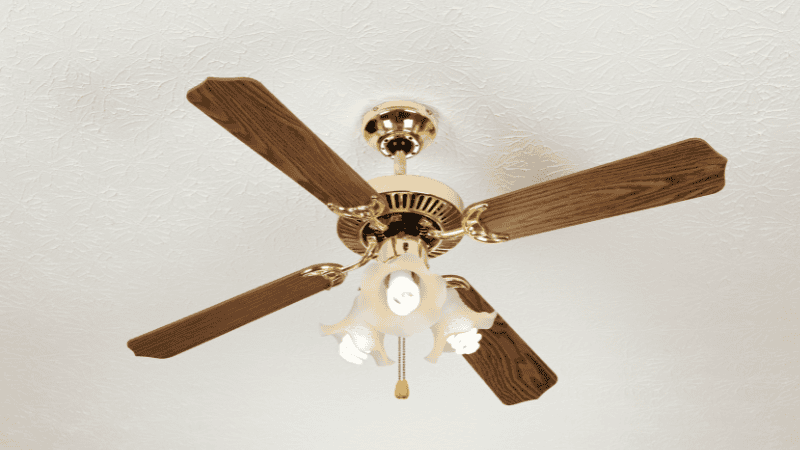
You enter a large room with vaulted ceilings and see a fantastic fan with multiple blades, and you’re just amazed by its ability to circulate wind throughout the room while being able to lift the look of the room.
Doesn’t it make you want to get one? But for many people, it is rather hard to hunt for the best ceiling fans for high ceilings. This guide on vaulted ceiling fans will provide you with a good idea of what to look for in a fan for the best airflow and style. At the same time, this is the best solution for your needs and business.
If you have high ceilings and large rooms, or you’re trying to keep a cathedral-style space well ventilated, you need more airflow to stay comfortable. That means choosing a fan with a strong motor and wide blades to move enough air throughout the entire space.
While smaller fans might seem like a cheaper option, they often can’t push air far enough, which leaves some areas feeling warm or stuffy. A fan that’s the right size for the room, on the other hand, keeps the air moving evenly, so every corner stays cool and comfortable.

Picking the right ceiling fan size does more than just keep you cool. It can help cut down on your energy bills. When air moves around the room the right way, your heating and cooling systems do not have to work as hard.
That means you stay comfortable without cranking up the heat or AC. In big rooms with high ceilings, a 52-inch fan with a light kit is a smart choice. It moves air well, lights up the space, and saves you from needing extra lights or wasting energy. In the long run, it just makes your home feel better and run more efficiently.
The size and structure of a ceiling fan can make a big difference in visual harmony, especially in places with high or vaulted ceilings. A fan that is the wrong size will look disproportionate to the room, taking away much of the magnificence that is supposed to be there with a high ceiling.
The fan industry is projected to grow to 14.65 billion by 2030. Conversely, a fan that is of good size complements the architecture of the room and also acts as a functional center point of beauty.

Modern, rustic, or traditional fan designs can align with the room’s decoration greatly and further improve its overall appeal while providing practical airflow.
The most concerning factor affecting your fan’s performance will probably be the wall height. If your ceiling is quite high, you will need to get a larger fan with higher motor capabilities for efficiency in moving air across space.
Keep in mind that the ceiling fan installation for high ceilings should be the right height; if it is installed too high, it cannot be effective, and if it is too low, it will be dangerous.
If you have a vaulted or sloped ceiling, you’ll need a fan designed to accommodate these angles. Look for angled mount-capable ceiling fans that can hang at the right angle for optimal airflow.
Without this feature, the fan may not circulate air properly, leaving certain areas of the room warmer than others.
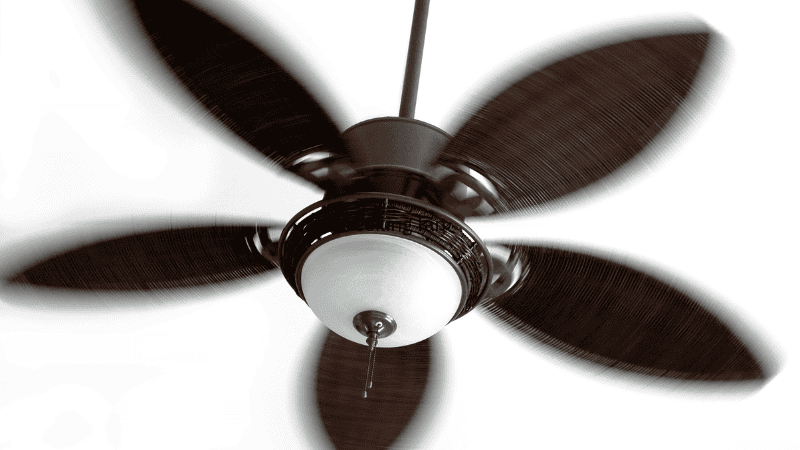
An adjustable downrod is a must for high ceilings. This feature allows you to tailor the cathedral fan’s height for the best performance.
If you select the right downrod length, you can make sure the fan is positioned properly for maximum air circulation.
The number of blades a fan can have truly can make a huge difference in the airflow and the amount of noise it generates.
A 3-blade fan tends to deliver more effective results in the aspect of moving air, while a 4 or 5-blade fan has the capability for quieter operations.
It actually depends on you whether you desire a quiet, gentle breeze or have the requirement of maximum airflow.
The Last feature, not the least, should be whether you want the fan placed indoors or outdoors. Certain models are designed specifically for outdoor spaces, so make sure your fan suits the space it will be in.
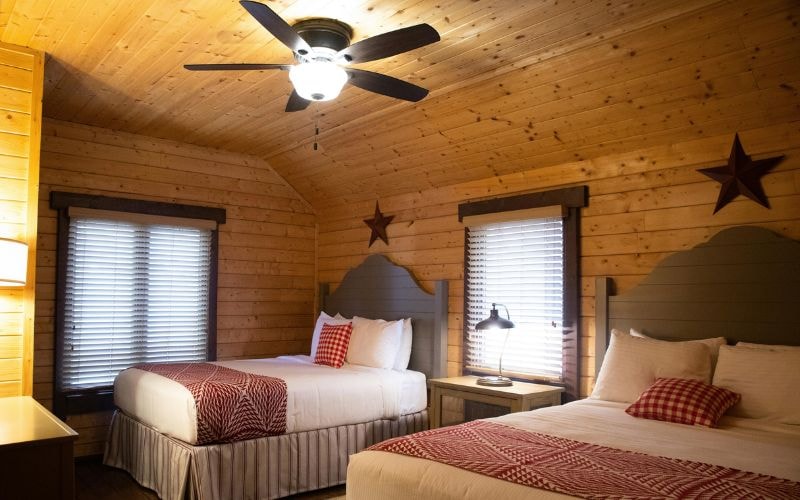
Before you purchase your fan, you need to calculate the square footage of your room by multiplying the length by the width.
Let’s take an example:
If your room is 15 feet by 20 feet, the total square footage is 300 sq. ft. Once you have the square footage, you can calculate the appropriate fan size.
For rooms between 200-400 sq. ft., a 52-56 inch fan should be ideal.
Larger rooms, 400-800 sq. ft., require fans ranging from size 56-72 inches for optimal air circulation.
The height of your ceiling directly impacts the fan size and placement. Below is a general guideline for you based on the height of the ceiling:
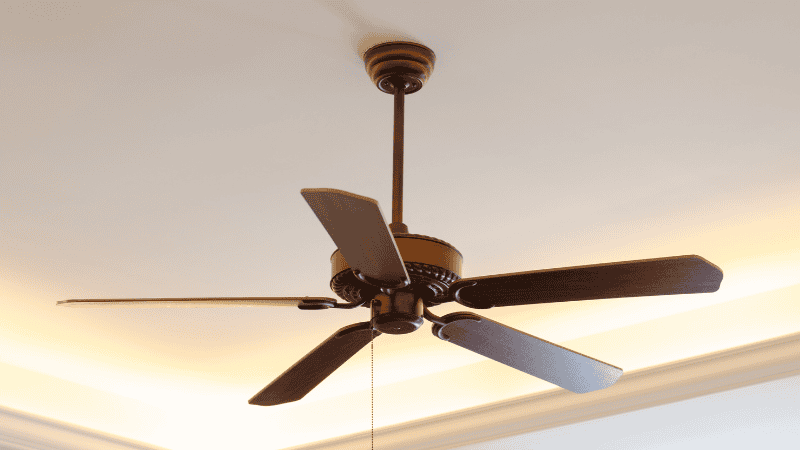
Fan blades should be broader and motors more powerful to ensure that air moves evenly in higher rooms and larger spaces. For example, a fan with blades from 56 to 72 inches would serve very well in large, spacious rooms with high ceilings.
The downroad is a critical component in high-fan installation. A longer downrod ensures that the fan is positioned at an optimal height for effective air circulation.
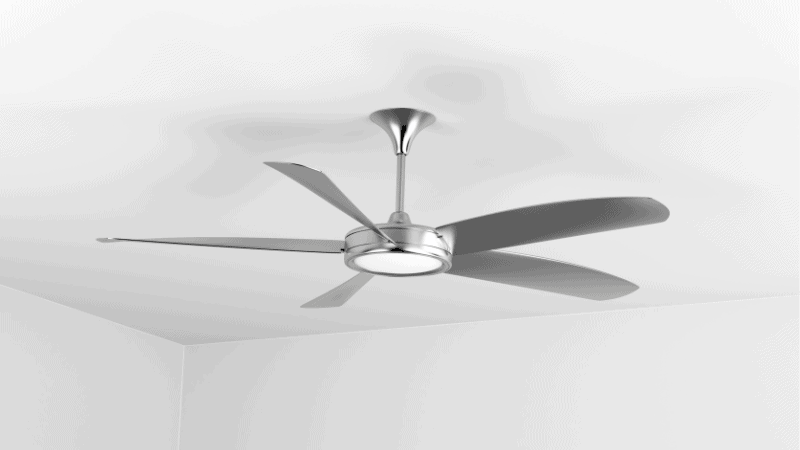
For ceilings above 12 feet, a downroad length of at least 12 to 24 inches is typically recommended. This allows the fan to operate efficiently while maintaining safety and comfort in your living space.
| Feature | High Ceilings | Vaulted/Cathedral Ceilings |
|---|---|---|
| Fan Size | Large blades (56-72 inches) for effective airflow. | Same size recommendations but make sure angle compatibility. |
| Mounting | Use long downrods (12-24 inches or more) for optimal height. | Adjustable mounting brackets for angled ceilings. |
| Place | Fan blades should be 8-10 feet above the floor. | Position carefully to account for sloped angles. |
| Aesthetic | Match décor with a sleek design; focus on balance in large spaces. | Choose visually striking models to complement angled designs. |
| Installation Tips | Secure mounting to ceiling joists; follow safety guidelines. | Use specialized kits for angled or sloped ceilings. |
Next, it’s important to calculate the distance of the fan from the ceiling. A fan too close to the ceiling will not be able to circulate air properly, while one located too far from it may induce an irregular flow of air. Most fans should ideally hang 8-9 feet above the ground to heighten air circulation efficiency.
Vaulted and cathedral ceilings became famous when the Romans and Greeks started using ceilings of these designs in their architecture; cathedral ceiling designs, with their sloped and angled construction, can become quite a hurdle for air circulation.
What happens is that the angled shape of these ceilings can cause air to fit in specific areas, thus leaving the room feeling warm and stuffy.
To counter this, all you’ve to do is search for a fan that is designed to accommodate these angles and maintain consistent circulation throughout the space.
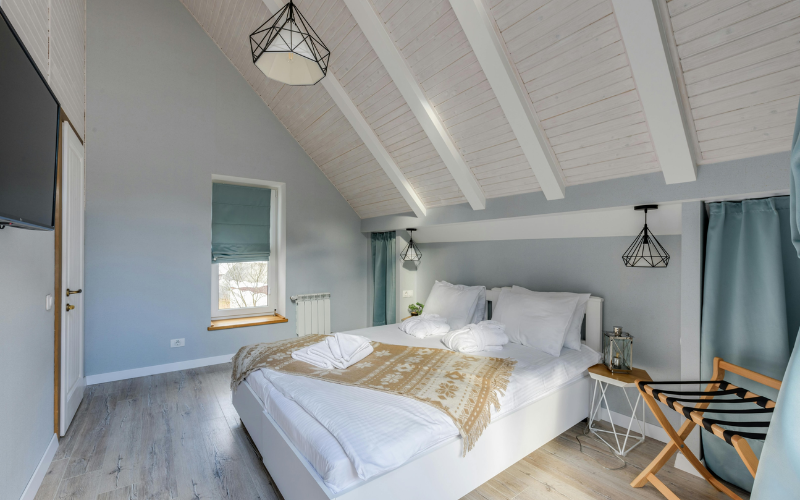
When dealing with sloped ceilings, it’s essential to select a fan designed for this type of installation. Sloped ceiling fans are specifically engineered to hang at the correct angle for optimal airflow, like the modern ceiling fan or the 52-inch 4-blade or 5-blade hanging fans.
These fans come with an adjustable mounting bracket that allows you to position the fan so that the blades are level, making sure air movement is efficient. If your ceiling is gently sloped or steeply vaulted, a sloped ceiling fan will ensure that your space is adequately cooled and circulated.
Long downrods are typically needed when placing fans in rooms with very high, arched, cathedral ceilings so that they may be hung at an optimum height.
With an extended downrod, the fan is hung lower, which puts it in the ideal position to circulate air effectively. For ceilings higher than 12 feet, a downrod of 12-24 inches may be necessary to make sure the fan is mounted low enough to move air throughout the entire room.
Proper downrod length is imperative for maximizing airflow and achieving comfort in your tall space.
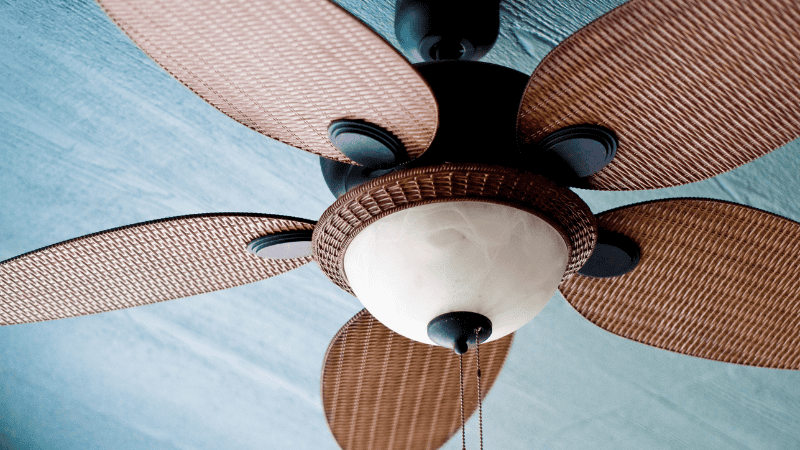
Ceiling fans come in many different styles and finishes. Whether you go for a sleek and modern look or something more traditional, you can always find something that matches your home style.
In the market, you can also browse many colors, designs, and materials, so get one that will complement your space’s aesthetic.
Unlike in the 90s when people couldn’t do much with their fans, now you can also add style and functionality to your fans.
Today’s trending fans can help brighten your room while providing the cool breeze you want, and it also works as getting 2 home products on one, saving you a lot of money.
Now, some fans are designed to connect with smart home devices; the feature lets you control the fan from your phone, voice assistant, or even a remote.
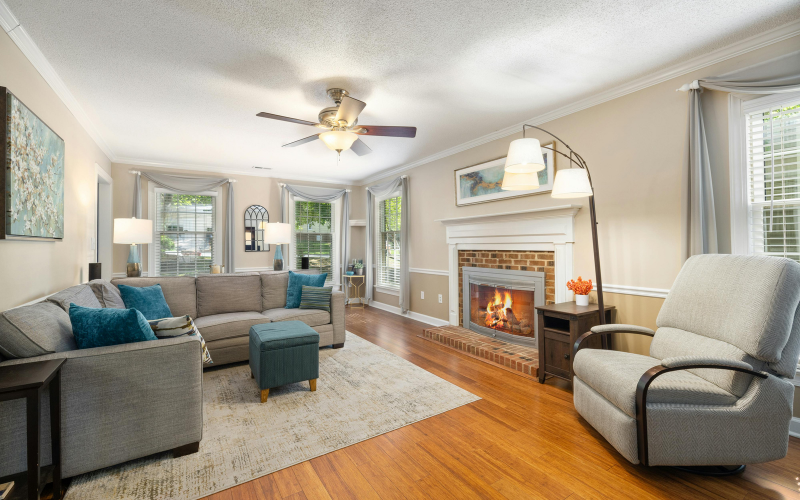
Check reviews from other buyers before making a purchase. This gives you an insight as to how the fan performs and for how long it could last. Compare products and get one perfect for your vaulted ceiling.
The very first step to a safe and secure installation is to carefully follow the manufacturer’s instructions given in the handbook.
Because different models of fans have separate ways in which they should be installed, adhering to instructions will save you from mistakes that are likely to occur and give you a safely operating and efficient fan.
One of the most important things you can do in the installation is to secure your fan to the ceiling joints.
To do this, use a stud finder to locate them and make sure your fan is mounted to a solid surface and does not wobble or fall over time.
A fan should be mounted from a solid point to support the weight and any additional features, such as lights or remote controls.

If you are not comfortable or don’t know how to install a fan yourself, or if the ceiling is very high or sloped, it’s best to hire a professional. A licensed handyman can handle the complexities of installation.
Before you start installing the fan, you need to check the weight mentioned in the box. Make sure that the fan and any additional features you may install, such as lighting fixtures, do not exceed the weight limits for your ceiling mount.
Also, make sure the wall is clear when installed and away from walls, lights, and other obstructions so the fan works properly and doesn’t create a safety hazard in your room.
Installing a ceiling fan for a tall ceiling room can dramatically enhance comfort and style, if done correctly. Here are some common pitfalls to avoid, along with practical advice to get the best results.
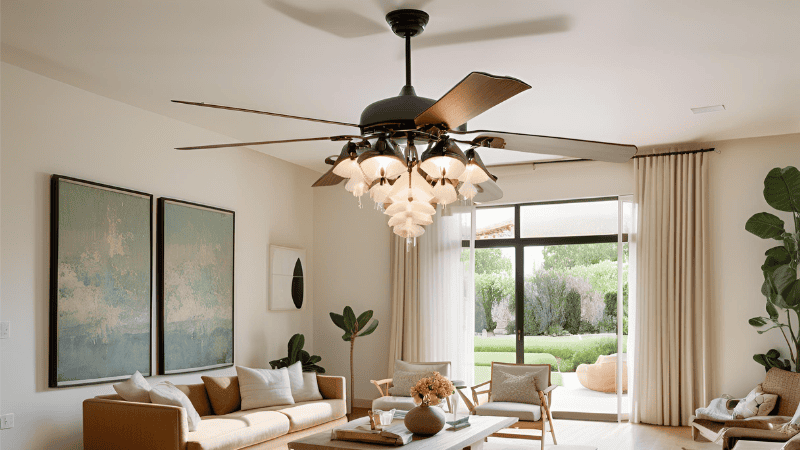
Probably the most stupid mistake would be purchasing a fan brand that is too small for the room. A small-span fan blade will not work efficiently in large spaces.
This obviously affects comfort but also creates energy inefficiency, as you may have to rely more on your HVAC system. Always use a fan size based on the room measurement when installing.
In large rooms, ceiling fans should be above 14 feet, for example, requiring the use of 56-inch or larger spans on their fans.
Improper placement is another issue. Installing a fan too close to the ceiling can hinder airflow, while placing it too far from the walls can waste its cooling potential.
The fan blades should ideally hang 8-10 feet above the floor and be at least 18 inches from the walls. For high ceilings, using a downrod of the appropriate length ensures optimal performance.
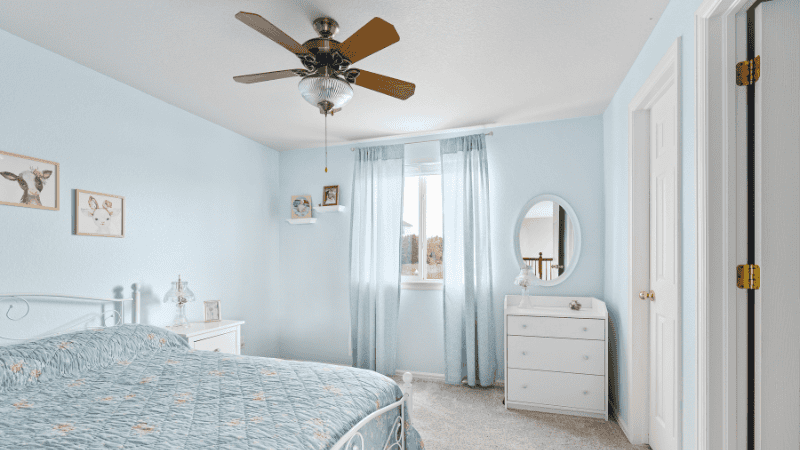
Vaulted and cathedral ceilings require special attention to the fan’s mounting angle. Ignoring this can lead to poor airflow or an unstable installation.
Fans with adjustable mounting brackets are specifically designed to accommodate angled ceilings, ensuring they hang securely and operate efficiently. Always verify the fan’s compatibility with your ceiling type before purchase.
It’s understandable that choosing the right roof fan for your high-ceiling room might feel overwhelming, but don’t worry, you’ve got us and the guide! Remember, the keys are size and blade number.
As we discussed, bigger rooms need bigger fans to keep the air flowing comfortably. An expert tip would be to make sure to pick a fan with enough motor power to handle the space. And let’s not forget the downrod! It helps the fan sit at just the right height for maximum airflow.
Don’t wait any longer to upgrade your home’s comfort and style with the perfect ceiling fan at RisunCorp. Our wholesale selection includes top-quality hanging fans, one-stop lighting solutions, and the accessories you need for safe and seamless installation, like downrods and angled mounting kits.
Check out us today for expert advice and innovative products that will keep your customers coming back for more. Your perfect solution is just a click away!
Comprehensive Lighting Solutions for MRO Wholesalers and Professionals
send your inquiry
Hi, I'm the author of this post, and I have been in this field for more than 15 years. If you want to wholesale lighting fixtures or lighting related product, feel free to ask me any questions.
Learn More >>Download our catalog to view all of our lighting products.
Ready to get started ?
Send Your InquiryOur team will get back to you promptly

please
download
Get notified about new products
Our team will get back to you promptly!
Add your first comment to this post